Howdy, and welcome to the third soiree for FRIDAY NIGHT FICTIONS*.
It’s a strong contingent this month. Each time I do this, seek out debut novels and collections of short stories, I’m impressed by the scope and daring of the writing, especially that released by the smaller and independent publishers.
The more I wade into the deep of promoting my book, the more I realise that success is based on personal connections. In the list below, I have previously reviewed Cameron Raynes‘ dry and exquisite collection of short stories (for The Australian), which prompted me to hire him to write an article for Newswrite (the magazine I edit for the NSW Writers’ Centre) on how a stutter has helped (and hindered) his creative life (one of my favourite articles, that makes me cry every time I read it). I have watched Alex Hammond talk at a NSW Writers’ Centre panel on how to market crime fiction. And I have read with interest the reviews of Snake Bite, that seem linked to my own work: both novels billed as Puberty Blues(es) for the contemporary age.
One of my favourite moments of pulling together FNF is to choose a writer to profile each month. Next up is an interview with Michael Adams (whose book The Last Girl featured in September) and I’ll be chatting to him next week.
And, ta dah!, the chosen one for October is Tracy Farr. “This is the story of Dame Lena Gaunt: musician, octogenarian, junkie.” With that opening line, I’m in!
If you’re a debut novelist or short story writer who’d like to contribute to next month’s edition, check out the guidelines and the August and September clubs.
For previous clubbers, I’ve also updated the August and September pages to see how writers are faring a couple of months in. Congrats to Dawn Barker, whose Fractured has been the most reviewed book on the Australian Women Writers’ website, and Melissa-Jane Pouliot, whose novel about a missing person has really struck a nerve (see both in the August edition). I like the idea of all the pages evolving each month (rather that remaining static), so please email me updates at any time, so everyone can track how you’re going, and get some inspiration…
Indie (self-published authors) have had a bit of a rough trot lately. Where are you hiding? Give me a hoy. This monthly club is especially geared to you!
FINALLY, I was also pretty thrilled to see the Sydney Morning Herald‘s Susan Wyndham give FRIDAY NIGHT FICTIONS and debut author Nina Smith a little plug in her weekly column. This has brought many new visitors to the site…
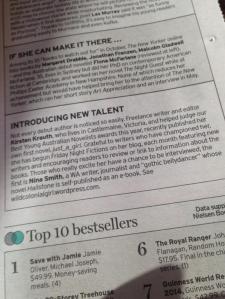
just_a_girl (and Friday Night Fictions) promoted in Susan Wyndham’s column in Sydney Morning Herald
*PS, as I post this, I realise it’s actually just turned to November and, due to unforeseen error (ie partying with Mikelangelo and the Black Sea Gentlemen at the Spotted Mallard in Brunswick), it’s more like Saturday Night Fever. Whoops. Anyway – enjoy!
SARAH AYOUB, Hate is Such a Strong Word
 Sophie Kazzi is in Year 12 at an all-Lebanese school where she is uncool and bored out of her brain. She’s desperate to find a little more to her life, documenting her hates in a journal that sounds like a rant list, not a diary.
Sophie Kazzi is in Year 12 at an all-Lebanese school where she is uncool and bored out of her brain. She’s desperate to find a little more to her life, documenting her hates in a journal that sounds like a rant list, not a diary.
Unfortunately, her father has antiquated ideas about women, curfews and the ‘Lebanese way’. Bad news for Sophie, who was hoping to spend Year 12 fitting in and having fun — not babysitting, studying or thinking about the accounting course she doesn’t want to do.
Then Shehadie Goldsmith arrives at school. Half-Australian and half-Lebanese, he’s even more of a misfit than Sophie. And with his arrogant, questioning attitude, he also has a way of getting under her skin.
But when simmering cultural tensions erupt in violence, Sophie must make a choice that will threaten the cultural ties that have protected her all her life.
Are her hates and complaints worth it?
Read an extract of the book on Harper Collins’ Summer of Supernatural page here.
Catch Sarah on her website + Facebook + Twitter.
Buy the book at any of these retailers.
CRAIG CLIFF, The Mannequin Makers
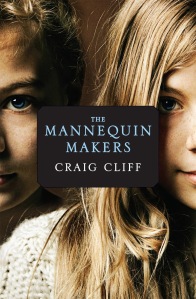 Two rival window dressers at the beginning of the Twentieth Century try to outdo each other with ever more elaborate displays and lifelike mannequins.
Two rival window dressers at the beginning of the Twentieth Century try to outdo each other with ever more elaborate displays and lifelike mannequins.
When one of the window dressers, Colton Kemp, is rocked by the sudden death of his wife, the rivalry takes on new dimensions. Inspired by a travelling Vaudeville company, Kemp decides to raise his children to be living mannequins.
What follows is a tale of art and deception, strength and folly, love and transgression, which spans a century and ranges from small-town New Zealand to the graving docks of Scotland, an inhospitable rock in the Southern Ocean to Sydney’s northern beaches.
Along the way we meet a Prussian strongman, a family of ship’s carvers with a mysterious affliction, a septuagenarian surf lifesaver and a talking figurehead named Vengeance.
Buy the printed version at Fishpond, Booktopia, The Nile or Mighty Ape. Buy the e-book from Amazon, iBooks or Kobo.
Read the first chapter here. Find Reading Group Questions on The Mannequin Makers here.
Visit Craig’s website or blog, or follow him on Twitter for more information.
SHADY COSGROVE, What the Ground Can’t Hold
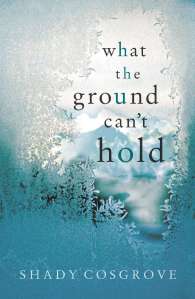 Two Americans are presumed dead and nine people are trapped in a cabin after an avalanche in the remote Andes…
Two Americans are presumed dead and nine people are trapped in a cabin after an avalanche in the remote Andes…
Among them is Emma, an Australian faced with an impossible decision that could see her parents jailed.
Jack, a teenager obsessed with Jack Kerouac, guided by a skewed moral compass.
Carmen, a tango dancer whose estranged father is dying of cancer.
Pedro, the cabin manager who’s in hiding from those he loves most.
And Wolfe, an American on a deadly family quest.
With food supplies dwindling, these unlikely companions are forced to extremes and discover they are bound by more than their surroundings — each has a secret that links them to Argentina’s Dirty War.
What the Ground Can’t Hold is a gripping exploration of the ways the past closes in on the present, and destroys the foundations upon which we build our lives.
Buy the book from Pan Macmillan, Boomerang Books and Booktopia.
Read an extract.
Shady’s November update:
Shady’s book has been getting some great coverage. See her blog for details + the Sydney Morning Herald, That Book You Like blog and Write Note Reviews.
TRACY FARR, The Life and Loves of Lena Gaunt
 This is the story of Dame Lena Gaunt: musician, octogenarian, junkie.
This is the story of Dame Lena Gaunt: musician, octogenarian, junkie.
Born in Singapore, bundled away to boarding school in Perth, Lena Gaunt has made her own way — through music — to a glittering career on the world stage as Music’s Most Modern Musician, the first theremin player of the twentieth century.
“Music from a theremin can sound like a human voice, an electronic scream…or the low moan of a cello.”
Through a life shaped by love and loss, her relationship with music endures. Lured out of retirement to play at a music festival, Lena finds herself under the gaze of documentary filmmaker Mo Patterson. Mo wants to tell the story of Lena’s life, loves and music — but Lena is reluctant to comply.
The Life and Loves of Lena Gaunt is a novel woven with sound, sea, the stories we tell (and don’t tell), and the spaces between.
Buy the book (paperback or e-book).
Read an extract.
Contact Tracy on Twitter and Facebook or at her website.
Listen to an interview with Tracy on ABC RN Books and Arts Daily.
Listen to Tracy read from her book at its New Zealand launch.
Tracey’s November update:
My book has been reviewed at The Incredible Rambling Elimy, Otago Daily Times and recommended, MUBAs and Shakers list, on the Kill Your Darlings blog. See my post about it.
ALEX HAMMOND, Blood Witness
 Melbourne defence lawyer Will Harris is reluctantly drawn into a bizarre murder trial. A terminally ill man claims to have witnessed the brutal crime — in a vision.
Melbourne defence lawyer Will Harris is reluctantly drawn into a bizarre murder trial. A terminally ill man claims to have witnessed the brutal crime — in a vision.
But the looming trial is more than just a media circus: it’s Will’s first big case since the tragic death of his fiance.
With pressure mounting, Will’s loyalties are split when his fiance’s sister is charged with drug trafficking.
The strain of balancing both cases takes its toll and Will finds himself torn between following the law and seeking justice.
“a slick, fast-paced legal thriller set in Melbourne but with a genuine international flavour and with enough twists to surprise even the most avid fans of the genre” – West Australian
“There’s romance and rumbling, knife fights, knuckle sandwiches and a cracking twist in the tale. Verdict: fast paced and gripping” – The Courier Mail
See more reviews.
Read an extract.
Buy a copy.
DIANE HESTER, Run to Me
 It’s been two years since Shyler O’Neil’s beloved son Jesse was killed, but his final moments are as vivid to her now as they were that dreadful day. Suffering from post-traumatic stress, and convinced she did not do enough to protect him, she retreats to an isolated cabin in the woods of northern Maine.
It’s been two years since Shyler O’Neil’s beloved son Jesse was killed, but his final moments are as vivid to her now as they were that dreadful day. Suffering from post-traumatic stress, and convinced she did not do enough to protect him, she retreats to an isolated cabin in the woods of northern Maine.
Zack Ballinger — a ten-year-old boy who’s never known a mother’s love — has seen too much and is running for his life. Pursued into the woods, he finds himself at Shyler’s cabin. He’ll take whatever help she can give — even though, for some reason, she keeps calling him Jesse . . .
Protecting Zack may well be Shyler’s one chance at redemption.
Or she is the child’s greatest threat . . .
Buy this book at Dymocks, Big W, Kmart, and other independent bookstores.
Available online from Dymocks and Angus & Robertson.
Available as an ebook from Amazon.
Read an extract.
Connect with Diane on her website and on Facebook.
ANGIE HOLST, Expectations
 Meet Sophia, Elise, Joe and Zoe. Four students at St Andrew’s College, tired of junior school’s same old routine, but starting to feel the heavy weight of expectation and responsibility that early adulthood brings.
Meet Sophia, Elise, Joe and Zoe. Four students at St Andrew’s College, tired of junior school’s same old routine, but starting to feel the heavy weight of expectation and responsibility that early adulthood brings.
Sophia is sick of being a part of shallow Gen Y, and feels like an old lady trapped in a young girl’s body: oh, and she’s realised she is identifying as lesbian, just to complicate matters.
Elise is an Aussie through and through except, well, she looks thoroughly Vietnamese and she’s a mathematical genius. But she really doesn’t want to become just another Asian nerd and she’s pretty sure she doesn’t want to study maths at uni.
Quirky Joe has always hung out with them so everybody at school has concluded that he’s kind of girly: you know, he’s smart and funny and gets along with girls, so clearly he must be gay or at the very least, metro. In reality, he’s a bubbling mass of testosterone, and that volcano of energy is about to blow as his home life becomes more and more tense.
And finally there’s Zoe. Zoe is beautiful, smart, and popular but she spends most nights alone, what with her mother running a busy solicitor’s practice and her father a politician. She wants to grow up fast, and have sex on her terms. But it’s that impatience that’s clouding her judgement — and will lead her to an absolute train wreck of a situation.
In the short space of a fortnight new friendships will develop, old friendships will change, and life lessons will be learnt. But one thing is certain: being sixteen has never been easy.
Read an extract.
Follow Angie on Twitter: @awoo75
Buy the ebook at Kobo.
SHARON KERNOT, Underground Road
 Damien, Edith, Kenneth and Mary are residents of a single street whose lives are ordinary to the last degree and as such encompass addiction and domestic violence, quiet achievements and small acts of kindness and treachery.
Damien, Edith, Kenneth and Mary are residents of a single street whose lives are ordinary to the last degree and as such encompass addiction and domestic violence, quiet achievements and small acts of kindness and treachery.
Jack and Mary, locked at uncomfortably close quarters on Jack’s retirement, chafe and sulk and fret.
Edith finds solace playing the pokies.
Damien lives in terror of his stepfather Marcus and the school bully and broods on revenge.
And Kenneth, unhinged, wanders the streets.
Lives intertwine and decisions are made, and the tension quietly grows to its shattering climax.
“There is dread in this work coupled with a great sense of normality and ordinariness. This is uncomfortable, political, ‘get real’ literature. The final scenes are riveting.” – Francesca Rendle-Short
Read an extract.
Buy the book.
November update:
Sharon Kernot has done a wonderful review of Margaret Merrilees’ ‘The First Week’ (which also features in this edition). Read her review in the REVIEWS section (at the bottom of this post).
KIRSTEN KRAUTH, just_a_girl
 Layla is only 14. She cruises online. She catches trains to meet strangers. Her mother, Margot, never suspects. Even when Layla brings a man into their home.
Layla is only 14. She cruises online. She catches trains to meet strangers. Her mother, Margot, never suspects. Even when Layla brings a man into their home.
Margot’s caught in her own web: an evangelical church and a charismatic pastor. Meanwhile, downtown, a man opens a suitcase and tenderly places his young lover inside.
just_a_girl tears into the fabric of contemporary culture, a Puberty Blues for the digital age, a Lolita with a webcam, it’s what happens when young girls are forced to grow up too fast. Or never get the chance to grow up at all.
““Krauth’s debut is alive with ideas about isolation and connection in the digital age, particularly the way the internet raises the stakes of teenage rebellion.” – Jo Case, The Australian
“It’s about porn/love, isolation/connection, sexualisation/justification, misogyny/mentality, Facebook and the face-to-face. It’s about our world, right now, and it’s a little bit brilliant.” – Danielle Binks, ALPHA READER.
Read an extract. Book Club Notes are available.
Buy the printed version at Readings, Booktopia or Amazon. The ebook is available at Amazon.com.au and iBooks.
International readers please contact me direct…
See reviews of just_a_girl here.
Contact Kirsten at Goodreads, her blog (Wild Colonial Girl), Facebook and Twitter. You can see her read from her work at the Sydney book launch, along with Emily Maguire (who introduced it).
Kirsten’s November update:
Erin Stewart did a review of ‘just_a_girl’ and Christie Thompson’s ‘Snake Bite’ (see below) for Birdee Magazine. There have also been wonderfully thought-provoking reviews from Elizabeth Lhuede at Devoted Eclectic and Margot McGovern at LIP magazine — and the book featured on a list of MUBAS and Shakers at the Kill Your Darlings blog.
MARK LAMPRELL, The Full Ridiculous
 A story about an ordinary family who go through an extraordinarily difficult time, told from the dad’s point of view, after he is hit by a car.
A story about an ordinary family who go through an extraordinarily difficult time, told from the dad’s point of view, after he is hit by a car.
When he doesn’t die, he is surprised and pleased. But he can’t seem to move from the crash position.
He can’t control his anger and grief, or work out what to do about anything much.
His wife is heroically supportive but his teenage children don’t help his post-accident angst: daughter Rosie punches a vindictive schoolmate, plunging her parents into parent-teacher hell; son Declan is found with a stash of drugs.
A strange policeman starts harassing the family and to top it all off, his professional life starts to crumble.
This novel about love, family and the precarious business of being a man, examines the terrible truth: sometimes you can’t pull yourself together until you’ve completely fallen apart.
Buy the book.
Mark Lamprell on Radio National’s Life Matters.
Contact Mark on Twitter.
MARGARET MERRILEES, The First Week
 This is a novel with its roots in a battered ancient landscape — the south of Western Australia.
This is a novel with its roots in a battered ancient landscape — the south of Western Australia.
But above all it is the story of one woman, Marian Anditon: pragmatist, farmer, mother.
When disaster strikes she is shocked and disorientated.
Hidden layers of grief and distress rise up around her like the salt of the degraded earth.
Her journey through the next week challenges all her previous assumptions.
Winner of the 2012 Unpublished Manuscript Award at Adelaide Writers’ Week.
Read an extract.
Order a copy.
Meet the author.
November update:
Sharon Kernot (see ‘Underground Road’ above) has done a wonderful review of Margaret’s book. Heather Taylor Johnson (see below) also fell in love with Margaret’s book. See their reviews at the bottom of the page.
EIMEAR MCBRIDE, A Girl is a Half-Formed Thing
 This novel tells the story of a young woman’s relationship with her brother, and the long shadow cast by his childhood brain tumour.
This novel tells the story of a young woman’s relationship with her brother, and the long shadow cast by his childhood brain tumour.
After years of rejections by UK publishers because it was too difficult to sell, A Girl is a Half-Formed Thing was picked up by a tiny independent press.
What followed was a debut novelist’s dream — an avalanche of critical acclaim and a rapturous response from readers.
In an intimate and compelling voice, McBride charts the progress of a young girl and her brother raised in a small Irish community.
A claustrophobic backdrop of poverty and devout faith surround this profound and devastating tale of love, betrayal and self-destruction.
Buy the book at Amazon.
CAMERON RAYNES, The Colour of Kerosene (and other stories)
 A welfare worker is asked to spy on a colleague. An artist finds ragged consolation in the breakdown of a relationship.
A welfare worker is asked to spy on a colleague. An artist finds ragged consolation in the breakdown of a relationship.
And, in the award-winning title story, a taxi driver accepts a fare he knows he shouldn’t:
“They headed east, the nude hills of the Geraldton plains, stripped bare of trees a century before, leaning into them on both sides as the car climbed into the marginal country. Behind him, Luke heard the gurgle of fluid sluicing out of a bladder and into a cup … It occurred to him that it was not too late to turn back.”
The fourteen stories in The Colour of Kerosene lay bare the ordinary moral dilemmas we face in contemporary Australia. The small wars we fight; the alliances we forge; the compromises we make. These are crafted stories in which regret and failure are often tempered by the possibility of redemption.
See samples (with illustrations).
Read an extract.
Buy the book.
November update: Jane Skelton commented (see her book ‘Lives of the Dead’ below):
The Colour of Kerosene – I love the title. The cover’s fab — and there’s a quote from Ron Rash! I’m always interested in new short story collections and this one, set in dry, harsh places, is certainly on my list. I’m intrigued to see this collection has illustrations — mine has photos. What do people think about that idea? Does it distract from the prose or add interest, another layer?
CLAIRE SCOBIE, The Pagoda Tree
 Tanjore, 1765. Maya plays among the towering granite temples of this ancient city in the heart of southern India. Like her mother before her, she is destined to become a devadasi, a dancer for the temple and it’s expected she will be chosen as a courtesan for the prince himself.
Tanjore, 1765. Maya plays among the towering granite temples of this ancient city in the heart of southern India. Like her mother before her, she is destined to become a devadasi, a dancer for the temple and it’s expected she will be chosen as a courtesan for the prince himself.
But as Maya comes of age, India is on the cusp of change. The prince is losing his power and the city is sliding into war. Maya is forced to flee her ancestral home, and heads to the bustling port city of Madras.
Maya captivates all who watch her dance. Thomas Pearce, an ambitious young Englishman is entranced from the moment he first sees her. But their love is forbidden, and comes at enormous cost.
Weaving together the uneasy meeting of two cultures, The Pagoda Tree is a captivating story of love, loss and fate.
Buy the book.
See the book trailer.
Read an extract.
Contact Claire on Facebook, Twitter and on her website.
November update: Jane Skelton (see below) commented:
I picked up ‘The Pagoda Tree’ at a friend’s place and began reading while she was dressing to go out. I love the enticing pink and green cover. I decided it’s a ‘can’t put it down’ kind of book from the the bit I read. But I couldn’t very well slip it into my bag! The prose is very vivid and filmic. It’s on my Christmas reading list for sure. I’m really interested to see how Claire Scobie brings to life a very different time and culture and resolves the story of Maya’s destiny. It’ll be one to take travelling.
JANE SKELTON, Lives of the Dead (and other stories)
 In this short story collection, Jane Skelton writes cool prose about hot landscapes, about characters seeking relief from strong emotions. Her characters twist and turn in the violent weather that is trying to break them, while inside their bodies the turmoil is as great as or greater than the outside world.
In this short story collection, Jane Skelton writes cool prose about hot landscapes, about characters seeking relief from strong emotions. Her characters twist and turn in the violent weather that is trying to break them, while inside their bodies the turmoil is as great as or greater than the outside world.
Combined with the spare prose, the emotion of the weather and the landscape is almost unbearable, except that, like waiting for the southerly buster on a hot afternoon, we wait to know what will happen to these characters. Will the storm pass over the islands, will it rain in outback Queensland and take the pressure down?
These evocative descriptions of the Australian landscape and keen observations of the people who inhabit it, bring to mind Thea Astley and Jessica Anderson.
Lives of the Dead is a haunting and lyrical debut collection by a talented writer.
Meet Jane at her website.
Buy the book online or in good bookshops.
See the book trailer.
Jane’s November update:
I’m interested in all the books here – it’s great to be part of this site and conversation. I’ll be checking back each month for updates… I’ve had a really good review by Heather Lunney on the NSW Writers’ Centre’s website.
HEATHER TAYLOR JOHNSON, Pursuing Love & Death
 It is customary to bring gifts to a wedding.
It is customary to bring gifts to a wedding.
But as daughter Luna prepares to marry her dream husband, the Smith family instead have in tow their own idiosyncratic brands of emotional baggage.
Her father, Graham, struggles to write his own own obituary; her mother, Velma, attempts to negotiate her mid-life crisis with a lover seventeen years her junior; her brother, Ginsberg, tries to come to term with being a homosexual who has inadvertently fallen in love with his wife.
Pursuing Love & Death is a darkly comic family saga, written with wit, lyricism and poignancy.
The storyline is believable, tragic and hilarious as clashing personalities unite for the first time in years — with explosive results.
Meet Heather at her blog.
Buy the book at Amazon.
Heather’s November update:
My book has been reviewed in the Advertiser by Katherine England …
Heather has also done a wonderful review of Margaret Merrilees’ The First Week. Read it at the bottom of this page.
CHRISTIE THOMPSON, Snake Bite
 Jez is seventeen and lives with her alcoholic single mum in in a government rental in Canberra’s outer-suburbs, with little money or future prospects. As well as suffering from terminal boredom, Jez has got epic First World Problems: where is her next pill coming from, what will her first tattoo be, and how will she ever lose her virginity?
Jez is seventeen and lives with her alcoholic single mum in in a government rental in Canberra’s outer-suburbs, with little money or future prospects. As well as suffering from terminal boredom, Jez has got epic First World Problems: where is her next pill coming from, what will her first tattoo be, and how will she ever lose her virginity?
Over the course of one blazing summer, Jez runs a gauntlet of new experiences and discovers the real meaning of home. Filled with humour, brilliant observations and raw revelations, Snake Bite is a coming-of-age story of a wild teenager in a Canberra you never dreamed existed. It will sink its fangs into, inject you with its intoxicating venom, and never let you go.
Read reviews at ABC’s Books and Arts Daily, That Book You Like blog, Goodreads and Sydney Morning Herald.
November update:
Erin Stewart reviews just_a_girl (see above) and Snake Bite for Birdee Magazine.
FRIDAY NIGHT FICTIONS REVIEW: Heather Taylor Johnson looks at Margaret Merrilees’ The First Week
I read Margaret Merrilees’ The First Week during my first week of convalescence with shingles. Having been too uncomfortable to move, reading seemed a good option and thus far I had read Flanagan’s The Narrow Road to the Deep North (dare I say it? Yes, yes I do: the next Miles Franklin) and Barracuda (by the author I think is doing something really important for our booming Australian identity, the brilliant Christos Tsiolkas). After such heavyweights, I was prepared to settle back into something less confronting, get off that obsession-train one sometimes finds herself on when reading back-to-back stunners of novels. But then I read the first paragraph of Merrilees’ book, and I simply couldn’t stop reading until I was through. Such was my fascination with Marion, the sixty-plus year old protagonist who finds herself way in over her farm-living head when her city-based son is found guilty of murdering two strangers in a grocery store, that I read the book in one day. It was a fantastic commentary on character, on Australia, and on where the two rally. A perfect triumvirate: Flanagan, Tsiolkas and Merrilees. And now I’m onto Winton. Will the goodness ever end?
FRIDAY NIGHT FICTIONS REVIEW: Sharon Kernot also responds to Margaret Merrilees’ The First Week
When Marian receives a phone call with the news that her youngest son has committed a serious crime her life changes dramatically and permanently. Prior to the incident Marian’s life is tough but predictable and seemingly dull. She has been a widow for many years and brought up her two sons on her own on a farm near the Stirling Ranges in Western Australia. Her eldest son stayed on at the farm while the younger one went to Perth to study at university.
The novel follows Marian’s first week after she receives the news that her youngest son, Charlie, is in trouble and, it turns out, has committed murder. She is understandably devastated and as she travels to Perth to find out exactly what has happened she is overwhelmed with confusion and grief and despair. She wonders how her son could do such a thing. She also wonders about her relationship with him and what might she have done to cause it. Who is to blame? And why?
When she arrives in Perth, Marian meets with Charlie’s friends and it becomes evident that his life is completely alien. He is like a stranger and his values are now opposed to those that he grew up with. His social activism and choice of friends are initially bewildering to Marian. Her opinions regarding racism, sexuality and farming practices are challenged and over the course of the week Marian struggles to reconcile these views. It is a strange and bleak time and Marian moves through it in a fog of sleep-deprivation doing things she would not normally do. At one point she allows herself some comfort with a stranger, and even goes back to his hotel room.
When Marian heads back home to the farm she does not have all the answers she hoped for. The motivation behind Charlie’s crime is not fully resolved but she has much to think about and her view of the world has changed considerably.
The First Week won the 2012 Wakefield Press Unpublished Manuscript Award at Adelaide Writers’ Week and it is easy to see why: it is instantly gripping and I was compelled to read on. Marian’s struggle to come to terms with her son’s actions, her grief, despair and confusion are insightfully and compassionately articulated, and the Western Australian environment — its dry salt-damaged landscape is beautifully and evocatively depicted.
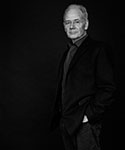







 A stunning new voice reminiscent of Maggie O’Farrell, which has been acclaimed by John Banville, Sebastian Barry, Roddy Doyle and Anne Enright. Unabridged edition, written and read by Michele Forbes.
A stunning new voice reminiscent of Maggie O’Farrell, which has been acclaimed by John Banville, Sebastian Barry, Roddy Doyle and Anne Enright. Unabridged edition, written and read by Michele Forbes. The Persuasion of Miss Jane Brody is set in Regency England. Jane Brody is a passionate follower of Mary Wollstonecraft’s beliefs in the rights of women. She campaigns for better education and employment opportunities for girls so they can be independent of men.
The Persuasion of Miss Jane Brody is set in Regency England. Jane Brody is a passionate follower of Mary Wollstonecraft’s beliefs in the rights of women. She campaigns for better education and employment opportunities for girls so they can be independent of men. Millie has decided that this will be her year for a relationship and when she meets sexy plumber Adam things start to look up, until he dumps her after what she thought was a fabulous date.
Millie has decided that this will be her year for a relationship and when she meets sexy plumber Adam things start to look up, until he dumps her after what she thought was a fabulous date. Layla is only 14. She cruises online. She catches trains to meet strangers. Her mother, Margot, never suspects. Even when Layla brings a man into their home.
Layla is only 14. She cruises online. She catches trains to meet strangers. Her mother, Margot, never suspects. Even when Layla brings a man into their home.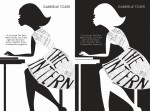 “Melons. The girls. Gazongas. I could rattle off every nickname in the world for my boobs — oops, nearly forgot jubblies — but it didn’t change the fact they were small. Embarrassingly small. Think grapes over melons, fun-size bags over fun bags, shot glasses over jugs.
“Melons. The girls. Gazongas. I could rattle off every nickname in the world for my boobs — oops, nearly forgot jubblies — but it didn’t change the fact they were small. Embarrassingly small. Think grapes over melons, fun-size bags over fun bags, shot glasses over jugs. Lawson is sent overseas to retrieve three paintings for a Kurt Von Honningsberg exhibition.
Lawson is sent overseas to retrieve three paintings for a Kurt Von Honningsberg exhibition.
 There are several unfinished novels in the bottom drawer; Lena wasn’t my first attempt at writing a novel, just the first one that was worth finishing. When I first started trying to write fiction, it was writing a novel that I had in mind — or a novella, in the vein of Brenda Walker’s Crush and One More River. But I just didn’t have the staying power — I’d get ten or twenty thousand words in, even forty thousand, then hit a big wall. I pulled back; I wondered if I could somehow develop my writing muscles by writing short stories, and that seemed to work for me. The novel and short story are very different forms, but I needed to learn how to write by learning to write short stories. Once I had the idea for Lena Gaunt, I realised I could trick myself into writing that novel by thinking of it as a series of related short stories. I’ve learnt enough through the process of writing this novel that I haven’t felt the need to trick myself into the next novel in the same way.
There are several unfinished novels in the bottom drawer; Lena wasn’t my first attempt at writing a novel, just the first one that was worth finishing. When I first started trying to write fiction, it was writing a novel that I had in mind — or a novella, in the vein of Brenda Walker’s Crush and One More River. But I just didn’t have the staying power — I’d get ten or twenty thousand words in, even forty thousand, then hit a big wall. I pulled back; I wondered if I could somehow develop my writing muscles by writing short stories, and that seemed to work for me. The novel and short story are very different forms, but I needed to learn how to write by learning to write short stories. Once I had the idea for Lena Gaunt, I realised I could trick myself into writing that novel by thinking of it as a series of related short stories. I’ve learnt enough through the process of writing this novel that I haven’t felt the need to trick myself into the next novel in the same way.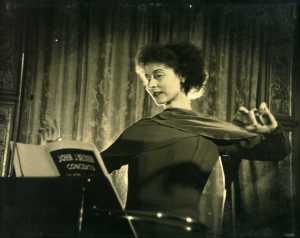












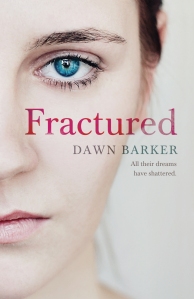 Which brings me to Anna, the central character in Fractured. Anna doesn’t sleep either. The world leading up to getting pregnant and giving birth is shown to be one of illusion, of unrealistic expectations. Highly organised, nothing seems to go to her often rigid plan. Her birth plan is ignored. Her feelings for her baby are not the way she had hoped.
Which brings me to Anna, the central character in Fractured. Anna doesn’t sleep either. The world leading up to getting pregnant and giving birth is shown to be one of illusion, of unrealistic expectations. Highly organised, nothing seems to go to her often rigid plan. Her birth plan is ignored. Her feelings for her baby are not the way she had hoped.
 “It was just Dad and me and Gully living in the flat above the shop in Blessington Street, St Kilda. We, the Martin family, were like inverse superheroes, marked by our defects. Dad was addicted to beer and bootlegs. Gully had ‘social difficulties’ that manifested in his wearing a pig-snout mask 24/7. I was surface clean but underneath a weird hormonal stew was simmering. My defects weren’t the kind you could see just from looking. Later I would decide they were symptoms of Nancy.”
“It was just Dad and me and Gully living in the flat above the shop in Blessington Street, St Kilda. We, the Martin family, were like inverse superheroes, marked by our defects. Dad was addicted to beer and bootlegs. Gully had ‘social difficulties’ that manifested in his wearing a pig-snout mask 24/7. I was surface clean but underneath a weird hormonal stew was simmering. My defects weren’t the kind you could see just from looking. Later I would decide they were symptoms of Nancy.”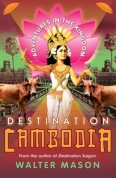 The ancient and mysterious ruins of Cambodia have long captured the imagination of visitors, more so now than ever before. In Destination Cambodia, Walter Mason charts an affectionate, intimate and deeply personal look at a Kingdom that has drawn him back again and again since his youth.
The ancient and mysterious ruins of Cambodia have long captured the imagination of visitors, more so now than ever before. In Destination Cambodia, Walter Mason charts an affectionate, intimate and deeply personal look at a Kingdom that has drawn him back again and again since his youth. How far can you push a child?
How far can you push a child? Bequeathed a century-old house, four estranged friends return to their home town, Calingarry Crossing, where each must stay for a season to fulfil the wishes of their beloved benefactor, Gypsy. Here they finally face the consequences of the tragic accident that occurred twenty years ago and changed their lives forever.
Bequeathed a century-old house, four estranged friends return to their home town, Calingarry Crossing, where each must stay for a season to fulfil the wishes of their beloved benefactor, Gypsy. Here they finally face the consequences of the tragic accident that occurred twenty years ago and changed their lives forever. My dad, he collects broken things … Where other people see junk he sees potential … My dad collects broken people too …
My dad, he collects broken things … Where other people see junk he sees potential … My dad collects broken people too … Whisky and Charlie are identical twins. But everything about them is poles apart. It’s got so bad that Charlie can’t even bear to talk to his brother anymore – until a freak accident steals Whisky from his family, and Charlie has to face the fact he may never speak to his brother again.
Whisky and Charlie are identical twins. But everything about them is poles apart. It’s got so bad that Charlie can’t even bear to talk to his brother anymore – until a freak accident steals Whisky from his family, and Charlie has to face the fact he may never speak to his brother again. An unforgettable novel that brings to life a new mother’s worst fears.
An unforgettable novel that brings to life a new mother’s worst fears. The imaginative stories in The Great Unknown take inspiration from vintage American TV programs such as The Twilight Zone and The Outer Limits—and their contemporaries and successors—paying tribute to the cultural influence these shows have had on lives ‘down under’.
The imaginative stories in The Great Unknown take inspiration from vintage American TV programs such as The Twilight Zone and The Outer Limits—and their contemporaries and successors—paying tribute to the cultural influence these shows have had on lives ‘down under’.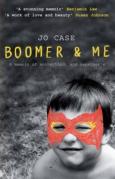 Leo is having trouble fitting in. Whether it’s pulling his pants down in the schoolyard or compulsively saluting Mazdas because the company sponsors his football team, Leo can never seem to say or do the right thing. And Jo is struggling to help him find his place as she juggles work and the ordinary demands of motherhood. But her beloved only child has been reading novels since he started school, amazes strangers with his encyclopaedic knowledge of sport statistics, and displays a wit sharp beyond his years – could he be gifted? In fact, it turns out Leo has Asperger’s Syndrome.
Leo is having trouble fitting in. Whether it’s pulling his pants down in the schoolyard or compulsively saluting Mazdas because the company sponsors his football team, Leo can never seem to say or do the right thing. And Jo is struggling to help him find his place as she juggles work and the ordinary demands of motherhood. But her beloved only child has been reading novels since he started school, amazes strangers with his encyclopaedic knowledge of sport statistics, and displays a wit sharp beyond his years – could he be gifted? In fact, it turns out Leo has Asperger’s Syndrome. The past isn’t dead. It isn’t even past …
The past isn’t dead. It isn’t even past … Faith, history, science and love collide in this fast-paced action adventure. High school teacher Shaun Strickland is shocked when he receives a last-minute invitation from Cambridge University to deliver a paper on the relationship between space and time, something he has been studying for years. It’s the break he’s been longing for.
Faith, history, science and love collide in this fast-paced action adventure. High school teacher Shaun Strickland is shocked when he receives a last-minute invitation from Cambridge University to deliver a paper on the relationship between space and time, something he has been studying for years. It’s the break he’s been longing for. This sword and sorcery fantasy begins when the magical continent of Reloria is threatened by cruel, scaly invaders called Vergai from the wastelands of Vergash. These invaders are barbaric and are intent on destroying the protective elven forcefield and conquering peaceful Reloria.
This sword and sorcery fantasy begins when the magical continent of Reloria is threatened by cruel, scaly invaders called Vergai from the wastelands of Vergash. These invaders are barbaric and are intent on destroying the protective elven forcefield and conquering peaceful Reloria.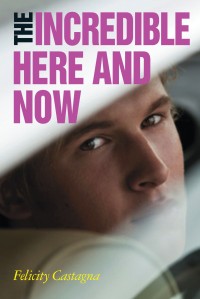 Something terrible happens the summer Michael turns 15.
Something terrible happens the summer Michael turns 15. At 17, Meda Melange is already an experienced serial killer. It’s not her fault, she doesn’t do it because she likes it (though she does). Meda eats souls, and there’s really only one place to get them — and it’s not the Piggly Wiggly. Then Meda learns she’s not the only soul-eater, she’s part demon, and the other demons are out to get her.
At 17, Meda Melange is already an experienced serial killer. It’s not her fault, she doesn’t do it because she likes it (though she does). Meda eats souls, and there’s really only one place to get them — and it’s not the Piggly Wiggly. Then Meda learns she’s not the only soul-eater, she’s part demon, and the other demons are out to get her. Life is about to get really complicated for Lindsay ap Rhys ap Gruffud as Queen Elizabeth the First lands in her garden.
Life is about to get really complicated for Lindsay ap Rhys ap Gruffud as Queen Elizabeth the First lands in her garden. Desperate to escape her grieving father and harbouring her own terrible secret, Shelley disappears into the intoxicating world of Aussie Rules football. Joining a motley crew of footy tragics — and, best of all, making friends with one of the star players — Shelley finds somewhere to belong. Finally she’s winning.
Desperate to escape her grieving father and harbouring her own terrible secret, Shelley disappears into the intoxicating world of Aussie Rules football. Joining a motley crew of footy tragics — and, best of all, making friends with one of the star players — Shelley finds somewhere to belong. Finally she’s winning. Zoe’s not completely happy with the way her life has turned out but she’s even less impressed with her death.
Zoe’s not completely happy with the way her life has turned out but she’s even less impressed with her death.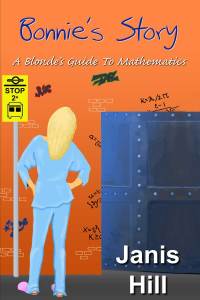 A Young Adult/New Adult chick lit tale told by Bonnie, a smart self-imposed blonde hairdresser with an attitude and cynical outlook on the life of science she grew up in.
A Young Adult/New Adult chick lit tale told by Bonnie, a smart self-imposed blonde hairdresser with an attitude and cynical outlook on the life of science she grew up in.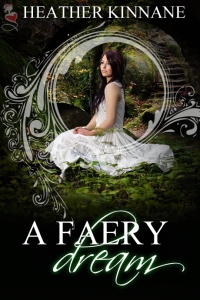 Ever had a dream you wished would come true?
Ever had a dream you wished would come true? Layla is only 14. She cruises online. She catches trains to meet strangers. Her mother, Margot, never suspects. Even when Layla brings a man into their home.
Layla is only 14. She cruises online. She catches trains to meet strangers. Her mother, Margot, never suspects. Even when Layla brings a man into their home. Beyond the killing fields and the temples of Angkor is Cambodia: a country with a genocidal past and a wide, open smile. A frontier land where anything is possible — at least for the tourists.
Beyond the killing fields and the temples of Angkor is Cambodia: a country with a genocidal past and a wide, open smile. A frontier land where anything is possible — at least for the tourists. Felicity Costello, aka Flick, is like any other 16-year-old — except for one difference. A difference she doesn’t want anyone to know about. A difference she hardly admits to herself.
Felicity Costello, aka Flick, is like any other 16-year-old — except for one difference. A difference she doesn’t want anyone to know about. A difference she hardly admits to herself.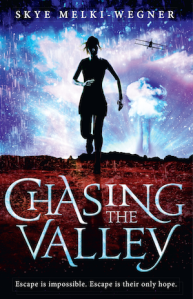 Escape is impossible. Escape is their only hope.
Escape is impossible. Escape is their only hope.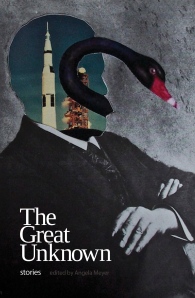 The imaginative stories in The Great Unknown take inspiration from vintage American TV programs such as The Twilight Zone and The Outer Limits — and their contemporaries and successors — paying tribute to the cultural influence these shows have had on lives ‘down under’.
The imaginative stories in The Great Unknown take inspiration from vintage American TV programs such as The Twilight Zone and The Outer Limits — and their contemporaries and successors — paying tribute to the cultural influence these shows have had on lives ‘down under’.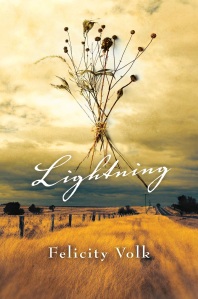 Amid the chaos of sweeping bushfires, Persia gives birth alone at home with tragic consequences. Traumatised and grieving, she travels north, and encounters Ahmed, a refugee fleeing deportation and his past in Pakistan.
Amid the chaos of sweeping bushfires, Persia gives birth alone at home with tragic consequences. Traumatised and grieving, she travels north, and encounters Ahmed, a refugee fleeing deportation and his past in Pakistan.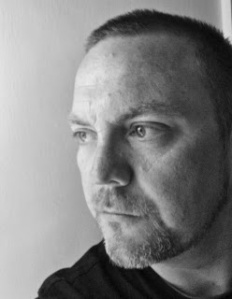
 What inspired you?
What inspired you?
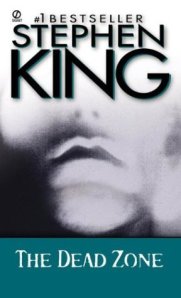

 I’ve got to know Annabel (virtually) in the past year. Her debut novel was published by UWA Publishing, like my own. And since
I’ve got to know Annabel (virtually) in the past year. Her debut novel was published by UWA Publishing, like my own. And since 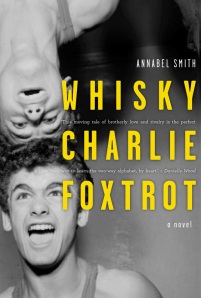 I was writing Whisky Charlie Foxtrot then. After my son was born I wrote a scene in which my protagonist Charlie goes to see his mother, and talks to her about his feeling that his brother was her favourite child. She reveals that it was in fact the opposite, and shares her guilt about this feeling. Parental guilt is something you can’t imagine if you haven’t had children. I’d heard people speak about the feeling that they were constantly doing something wrong, or letting their children down in some way and I’d think, just let it go, stop beating yourself up about it. Then I became a parent and I experienced it for myself and I understood how it gets hold of you. So I wouldn’t have thought of writing that scene unless I had experienced that.
I was writing Whisky Charlie Foxtrot then. After my son was born I wrote a scene in which my protagonist Charlie goes to see his mother, and talks to her about his feeling that his brother was her favourite child. She reveals that it was in fact the opposite, and shares her guilt about this feeling. Parental guilt is something you can’t imagine if you haven’t had children. I’d heard people speak about the feeling that they were constantly doing something wrong, or letting their children down in some way and I’d think, just let it go, stop beating yourself up about it. Then I became a parent and I experienced it for myself and I understood how it gets hold of you. So I wouldn’t have thought of writing that scene unless I had experienced that.
 Sophie Kazzi is in Year 12 at an all-Lebanese school where she is uncool and bored out of her brain. She’s desperate to find a little more to her life, documenting her hates in a journal that sounds like a rant list, not a diary.
Sophie Kazzi is in Year 12 at an all-Lebanese school where she is uncool and bored out of her brain. She’s desperate to find a little more to her life, documenting her hates in a journal that sounds like a rant list, not a diary. Two rival window dressers at the beginning of the Twentieth Century try to outdo each other with ever more elaborate displays and lifelike mannequins.
Two rival window dressers at the beginning of the Twentieth Century try to outdo each other with ever more elaborate displays and lifelike mannequins. Two Americans are presumed dead and nine people are trapped in a cabin after an avalanche in the remote Andes…
Two Americans are presumed dead and nine people are trapped in a cabin after an avalanche in the remote Andes… Melbourne defence lawyer Will Harris is reluctantly drawn into a bizarre murder trial. A terminally ill man claims to have witnessed the brutal crime — in a vision.
Melbourne defence lawyer Will Harris is reluctantly drawn into a bizarre murder trial. A terminally ill man claims to have witnessed the brutal crime — in a vision. It’s been two years since Shyler O’Neil’s beloved son Jesse was killed, but his final moments are as vivid to her now as they were that dreadful day. Suffering from post-traumatic stress, and convinced she did not do enough to protect him, she retreats to an isolated cabin in the woods of northern Maine.
It’s been two years since Shyler O’Neil’s beloved son Jesse was killed, but his final moments are as vivid to her now as they were that dreadful day. Suffering from post-traumatic stress, and convinced she did not do enough to protect him, she retreats to an isolated cabin in the woods of northern Maine. Meet Sophia, Elise, Joe and Zoe. Four students at St Andrew’s College, tired of junior school’s same old routine, but starting to feel the heavy weight of expectation and responsibility that early adulthood brings.
Meet Sophia, Elise, Joe and Zoe. Four students at St Andrew’s College, tired of junior school’s same old routine, but starting to feel the heavy weight of expectation and responsibility that early adulthood brings. Damien, Edith, Kenneth and Mary are residents of a single street whose lives are ordinary to the last degree and as such encompass addiction and domestic violence, quiet achievements and small acts of kindness and treachery.
Damien, Edith, Kenneth and Mary are residents of a single street whose lives are ordinary to the last degree and as such encompass addiction and domestic violence, quiet achievements and small acts of kindness and treachery. A story about an ordinary family who go through an extraordinarily difficult time, told from the dad’s point of view, after he is hit by a car.
A story about an ordinary family who go through an extraordinarily difficult time, told from the dad’s point of view, after he is hit by a car. This is a novel with its roots in a battered ancient landscape — the south of Western Australia.
This is a novel with its roots in a battered ancient landscape — the south of Western Australia. This novel tells the story of a young woman’s relationship with her brother, and the long shadow cast by his childhood brain tumour.
This novel tells the story of a young woman’s relationship with her brother, and the long shadow cast by his childhood brain tumour. A welfare worker is asked to spy on a colleague. An artist finds ragged consolation in the breakdown of a relationship.
A welfare worker is asked to spy on a colleague. An artist finds ragged consolation in the breakdown of a relationship. Tanjore, 1765. Maya plays among the towering granite temples of this ancient city in the heart of southern India. Like her mother before her, she is destined to become a devadasi, a dancer for the temple and it’s expected she will be chosen as a courtesan for the prince himself.
Tanjore, 1765. Maya plays among the towering granite temples of this ancient city in the heart of southern India. Like her mother before her, she is destined to become a devadasi, a dancer for the temple and it’s expected she will be chosen as a courtesan for the prince himself. In this short story collection, Jane Skelton writes cool prose about hot landscapes, about characters seeking relief from strong emotions. Her characters twist and turn in the violent weather that is trying to break them, while inside their bodies the turmoil is as great as or greater than the outside world.
In this short story collection, Jane Skelton writes cool prose about hot landscapes, about characters seeking relief from strong emotions. Her characters twist and turn in the violent weather that is trying to break them, while inside their bodies the turmoil is as great as or greater than the outside world. It is customary to bring gifts to a wedding.
It is customary to bring gifts to a wedding. Jez is seventeen and lives with her alcoholic single mum in in a government rental in Canberra’s outer-suburbs, with little money or future prospects. As well as suffering from terminal boredom, Jez has got epic First World Problems: where is her next pill coming from, what will her first tattoo be, and how will she ever lose her virginity?
Jez is seventeen and lives with her alcoholic single mum in in a government rental in Canberra’s outer-suburbs, with little money or future prospects. As well as suffering from terminal boredom, Jez has got epic First World Problems: where is her next pill coming from, what will her first tattoo be, and how will she ever lose her virginity?